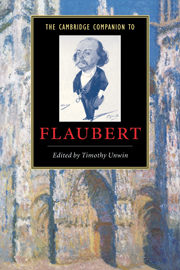Book contents
- Frontmatter
- 1 Gustave Flaubert, the hermit of Croisset
- 2 Flaubert’s place in literary history
- 3 Flaubert’s early work
- 4 Flaubert’s travel writings
- 5 Flaubert’s correspondence
- 6 History and its representation in Flaubert’s work
- 7 Death and the post mortem in Flaubert’s works
- 8 The art of characterisation in Flaubert’s fiction
- 9 The stylistic achievements of Flaubert’s fiction
- 10 The writing process
- 11 Flaubert and the visual
- 12 The theatre in the work of Flaubert
- 13 Flaubert’s failure
- 14 Flaubert, our contemporary
- Select bibliography
- Index
- Series List
4 - Flaubert’s travel writings
Published online by Cambridge University Press: 28 May 2006
- Frontmatter
- 1 Gustave Flaubert, the hermit of Croisset
- 2 Flaubert’s place in literary history
- 3 Flaubert’s early work
- 4 Flaubert’s travel writings
- 5 Flaubert’s correspondence
- 6 History and its representation in Flaubert’s work
- 7 Death and the post mortem in Flaubert’s works
- 8 The art of characterisation in Flaubert’s fiction
- 9 The stylistic achievements of Flaubert’s fiction
- 10 The writing process
- 11 Flaubert and the visual
- 12 The theatre in the work of Flaubert
- 13 Flaubert’s failure
- 14 Flaubert, our contemporary
- Select bibliography
- Index
- Series List
Summary
Flaubert is now recognised as one of the greatest travel writers. His travels may not have been of the same order of magnitude as those of, for example, the mighty Humboldt, whose accounts of South America, distilled into the Tableaux de la nature, Flaubert found so captivating. Yet he travelled far more widely and intensively than other major writers of the period who drew on travel as generously as he did for inspiration, writers such as Baudelaire, Fromentin, Gautier and Nerval. However, unlike most travel writers of the time, Flaubert did not publish any of his accounts, with the exception of one fragment from Par les champs et par les grèves, which does not look like travel writing at all. He held the genre in very low esteem: it was 'triste' (Cor. ii 327), 'facile' (Cor. iii 96), a poor, shabby sub-species of literature, which he had learned from his own experience was also almost 'impossible' (Cor. iii 561). According to his friend and travelling companion, Maxime Du Camp, Flaubert wrote travel accounts only in order to toughen up his style ['corser le style']; 'there was no difference in his mind between writing a travel account and reporting on some trivial event: both were low-grade literature' ['écrire un voyage ou rédiger un fait divers, pour lui c'était tout un, c'était de la basse littérature']. This, though - if we take a broader view of what constitutes 'style' than Du Camp did - is precisely what makes them the masterpieces they are. Even when Flaubert confines himself to note form, as in the Voyage en Italie, the Voyage en Orient and Carthage, the notes are so suited to their subject and to the writer's project, they are so acute, subtle and evocative, that they put apparently more 'finished' accounts by other writers in the shade.
- Type
- Chapter
- Information
- The Cambridge Companion to Flaubert , pp. 51 - 66Publisher: Cambridge University PressPrint publication year: 2004
- 1
- Cited by



